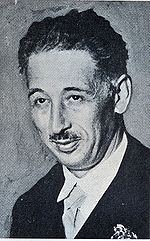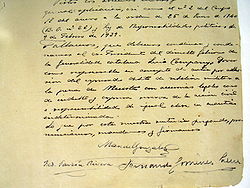- Lluís Companys
-
This is a Catalan name. The first family name is Companys and the second is Jover.
Lluís Companys 

123rd President of the Generalitat de CatalunyaIn office
December 25, 1933 – October 15, 1940
(Acting until January 1, 1934
In exile from January 23, 1939 to October 15, 1940)Preceded by Francesc Macià Succeeded by Josep Irla 4th Acting President of the Catalan Republic In office
October 6, 1934 – October 7, 1934Preceded by Francesc Macià
In 1931Succeeded by Himself, as President of the Generalitat de Catalunya 1st President of the Parliament of Catalonia In office
December 14, 1932 – June 20, 1933Preceded by New title Succeeded by Joan Casanovas i Maristany Minister of the Marine of Spain In office
June 20, 1933 – September 12, 1933Preceded by José Giral Succeeded by Vicente Iranzo Enguita Personal details Born June 21, 1882
El Tarròs, UrgellDied October 15, 1940 (aged 58)
BarcelonaPolitical party ERC Spouse(s) Mercè Micó (div.)
Carme BallesterChildren Lluís (1911–1956) Lluís Companys i Jover (Catalan pronunciation: [ʎuˈis kumˈpaɲs]) (June 21, 1882 – October 15, 1940) was the 123rd President of Catalonia, Spain from 1934 and during the Spanish Civil War.
He was a lawyer and leader of the Republican Left of Catalonia (ERC) political party. Exiled after the war, he was captured and handed over by the Nazi secret police, the Gestapo, to the Spanish dictatorship of Francisco Franco, who had him executed by firing squad in 1940. Companys is the only incumbent president of a region in Europe to have been executed,[1] and seventy one years later the Spanish state has not yet annulled the council of war which sentenced him.
Contents
Life
Companys was the son of farmers Josep Companys and Maria Lluïsa de Jover. After getting his law degree from the Universitat de Barcelona, Companys participated in the political life of Catalonia from a young age. In 1906, as a result of the military burning the writings of Catalan newspapers Cu-Cut! and La Veu de Catalunya, and after the passing of the Ley de Jurisdicciones ("Law of Jurisdictions"), which made speech against Spain and its symbols a criminal offence, he participated in the creation of Solidaridad Catalana.
Later, he became affiliated to the ephemeral Unió Federal Nacionalista Republicana, of which he was president of the youth section. He was investigated for his intense youth activities and was jailed fifteen times, being classified after the Tragic Week of Barcelona as a "dangerous individual" in police records.
With Francesc Layret, Companys represented the left-wing labor faction of the Partit Republicà Català (Catalan Republican Party), for which he was elected councillor of Barcelona in 1916. In November 1920, he was detained together with Salvador Seguí (known as El Noi del Sucre), Martí Barrera, Josep Viadiu, and other trade unionists and was deported to the Castell de la Mola in Mahón, on Menorca. Shortly afterward, Layret was assassinated while preparing his defence.
Despite his deportation, in the 1920 legislative elections, Companys was elected deputy of Sabadell, taking the place of Layret, who was to have taken that seat prior to his assassination. This gave him parliamentary immunity, which secured his release from prison.
Companys was one of the founders of Unió de Rabassaires in 1922, for which he worked as a lawyer and director of the magazine La Terra during the years of the regime of Primo de Rivera.
Detained again, he was unable to attend the Conferencia de Izquierdas (Conference of Leftists) held between March 12 and March 19, 1931, from which was born the ERC political party; however, he was elected as an executive member of that party, representing the Partit Republicà Català. Thanks to the bonds between the Spanish labor movement and the Spanish union movement, the election of Companys to this position gave the ERC great prestige amongst left-wing public opinion, whereas before, it had been considered a party of the small progressive bourgeoisie.
On October 6, 1934, Companys led a Catalan Nationalist uprising against the center and right-wing republican government, and proclaimed the Catalan State (Estat Català),[2] an action for which he was arrested and sentenced to thirty years in prison.[3] However, after the 1936 election and the victory of the left-wing coalition Frente Popular, he was set free by the new government.
When the Spanish Civil War began shortly after, in July 1936, Companys sided with the Second Spanish Republic against the Nacionales rebels and was instrumental in organizing a collaboration between the Central Committee of Anti-Fascist Militias, which was sponsored by his Catalan government, and the Workers' Party of Marxist Unification (POUM), a revolutionary anti-Stalinist communist party, and Confederación Nacional del Trabajo (CNT), an anarchist syndicalist trade union.[4]
During the war, Companys attempted to maintain the unity of his political coalition, but after the Soviet Union consul, Vladimir Antonov-Ovseenko, threatened that his country would cut off aid to Catalonia, he sacked Andrés Nin from his post as minister of Justice in December 1936.
Exiled to France in 1939 after the Civil War, he was arrested and extradited by Nazi German authorities to the Spanish government in September 1940.[5] Companys was executed, after a military trial lacking legal guarantees, at Montjuïc Castle on October 14, 1940.[6] He is buried at the Montjuïc Cemetery, near the castle.
The main stadium used for the 1992 Summer Olympics, located on Montjuïc, is officially named in his memory. In 1998 a monument to Companys was installed near Arc de Triomf, on Passeig de Lluís Companys in Barcelona. A friend of Companys, Conxita Julià, is portrayed next to Companys' image in the monument.
See also
- Catalan Republic
- Passeig de Lluís Companys in Barcelona
- List of people executed by Francoist Spain
References
- ^ http://www.victoralexandre.cat/index.php?option=com_content&task=view&id=783&Itemid=63
- ^ Preston, Paul. The Spanish Civil War. Reaction, revolution & revenge. Harper Perennial. London. 2006. p.78
- ^ Beevor, Antony. The battle for Spain. The Spanish Civil War 1936–1939. Penguin Books. 2006. London. p.30
- ^ Preston, Paul. The Spanish Civil War. Reaction, revolution & revenge. Harper Perennial. London. 2006. pp.253–254
- ^ Juliá, Santos; Casanova, Julián; Solé i Sabaté, Josep Maria; Villarroya; Moreno, Francisco. Victimas de la guerra civil. Ediciones Temas de Hoy. 1999. Madrid. p.331
- ^ Burns, Jimmy (2000). Barca: a people's passion. Bloomsbury. p. 126.
External links
Political offices Preceded by
Francesc MaciàPresident of the Generalitat de Catalunya
Acting until January 1, 1934
in exile from January 23, 1939 to October 15, 1940
1933–1940Succeeded by
Josep Irla
In exilePreceded by
New titlePresident of the Parliament of Catalonia
1932–1933Succeeded by
Joan Casanovas i MaristanyPreceded by
Francesc Macià,
in 1931Acting President of the Catalan Republic
1934Succeeded by
Himself, as President of the Generalitat de CatalunyaPreceded by
José GiralMinister of Marine of Spain
1933Succeeded by
Vicente Iranzo EnguitaParty political offices Preceded by
Francesc MaciàPresident of ERC
1933–1934Succeeded by
Carles Pi i SunyerPreceded by
Carles Pi i SunyerPresident of ERC
1936–1940Succeeded by
Vacant,
next in 1993, Heribert Barrera i CostaBerenguer de Cruïlles · Romeu Sescomes · Ramon Gener · Bernat Vallès · Romeu Sescomes · Joan I d'Empúries · Guillem de Guimerà · Galceran de Besora · Ramon Gener · Felip d'Anglesola · Pere de Santamans · Arnau Descolomer · Miquel de Santjoan · Alfons de Tous · Marc de Vilalba · Andreu Bertran · Joan Desgarrigues · Dalmau de Cartellà · Felip de Malla · Domènec Ram · Marc de Vilalba · Pere de Palou · Pere de Darnius · Antoni d'Avinyó i de Moles · Jaume de Cardona i de Gandia · Pero Ximénez de Urrea · Bertran Samasó · Bernat Guillem Samasó · Nicolau Pujades · Antoni Pere Ferrer · Manuel de Montsuar · Francesc Colom · Ponç Andreu de Vilar · Miquel Samsó · Joan Maurici de Ribes · Miquel Delgado · Pere Joan Llobera · Berenguer de Sos · Pere de Cardona · Ponç Andreu de Vilar · Juan Payo Coello · Joan de Peralta · Francí Vicenç · Pedro de Mendoza · Alfons d'Aragó · Ferrer Nicolau de Gualbes i Desvalls · Gonzalo Fernández de Heredia · Lluís Desplà i d'Oms · Jordi Sanç · Joan d'Aragó · Jaume Fiella · Esteve de Garret · Bernat de Corbera · Joan Margarit i de Requesens · Lluís de Cardona i Enríquez · Francesc de Solsona · Francesc Oliver de Boteller · Dionís de Carcassona · Joan Pasqual · Jeroni de Requesens i Roís de Liori · Miquel Puig · Jaume Caçador · Miquel d'Oms i de Sentmenat · Onofre de Copons i de Vilafranca · Miquel de Ferrer i de Marimon · Joan de Tormo · Miquel de Tormo · Francesc Jeroni Benet Franc · Pere Àngel Ferrer i Despuig · Ferran de Lloances i Peres · Miquel d'Oms i de Sentmenat · Onofre Gomis · Francesc Giginta · Benet de Tocco · Jaume Cerveró · Pere Oliver de Boteller i de Riquer · Benet de Tocco · Rafael d'Oms · Jaume Beuló · Pere Oliver de Boteller i de Riquer · Martí Joan de Calders · Francesc Oliver de Boteller · Jaume Caçador i Claret · Miquel d'Agullana · Francesc Oliver de Boteller · Francesc Oliveres · Jaume Cordelles i Oms · Bernat de Cardona i de Queralt · Pere Pau Caçador i d'AguilarDusai · Onofre d'Alentorn i de Botella · Francesc de Sentjust i de Castre · Ramon d'Olmera i d'Alemany · Miquel d'Aimeric · Lluís de Tena · Benet Fontanella · Pere de Magarola i Fontanet · Francesc Morillo · Pere Antoni Serra · Esteve Salacruz · García Gil de Manrique y Maldonado · Miquel d'Alentorn i de Salbà · Pau Claris i Casademunt · Josep Soler · Bernat de Cardona i de Raset · Gispert d'Amat i Desbosc de Sant Vicenç · Andreu Pont · Pau del Rosso · Francesc Pijoan · Joan Jeroni Besora · Pau d'Àger · Jaume de Copons i de Tamarit · Josep de Magarola i de Grau · Joan Pagès i Vallgornera · Josep de Camporrells i de Sabater · Esteve Mercadal i Dou · Alfonso de Sotomayor · Josep Sastre i Prats · Baltasar de Muntaner i de Sacosta · Antoni de Saiol i de Quarteroni · Benet Ignasi de Salazar · Antoni de Planella i de Cruïlles · Rafael de Pinyana i Galvany · Climent de Solanell i de Foix · Josep Antoni Valls i Pandutxo · Antoni de Planella i de Cruïlles · Francesc de Valls i Freixa · Josep Grau · Manuel de Copons i d'Esquerrer · Francesc Antoni de Solanell i de Montellà · Josep de Vilamala · Francesc Macià i Llussà · Lluís Companys i Jover · Josep Irla i Bosch · Josep Tarradellas i Joan · Jordi Pujol i Soley · Pasqual Maragall i Mira · José Montilla Aguilera · Artur Mas i Gavarró
Francesc Macià i Llussà · Lluís Companys i Jover · Carles Pi i Sunyer · Lluís Companys i Jover · Vacant 1940-1993 · Heribert Barrera · Jaume Campabadal · Jordi Carbonell i de Ballester · Josep-Lluís Carod-Rovira · Joan Puigcercós i BoixassaLluís Companys i Jover · Joan Casanovas i Maristany · Josep Irla i Bosch · Antoni Rovira i Virgili · Manuel Serra i Moret · Francesc Farreres i Duran · Heribert Barrera i Costa · Miquel Coll i Alentorn · Joaquim Xicoy i Bassegoda · Joan Reventós i Carner · Joan Rigol i Roig · Ernest Benach i Pascual · Núria de Gispert i CatalàCategories:- 1882 births
- 1940 deaths
- People from Urgell (comarca)
- Catalan politicians
- Executed politicians
- Executed presidents
- Republican Left of Catalonia politicians
- Spanish people of the Spanish Civil War
- Presidents of the Republican Left of Catalonia
- Presidents of the Parliament of Catalonia
- Presidents of Generalitat de Catalunya
- People executed by Francoist Spain
- Executed Spanish people
- Deaths by firearm in Spain
- People executed by firing squad
- Burials at Montjuïc Cemetery
Wikimedia Foundation. 2010.


